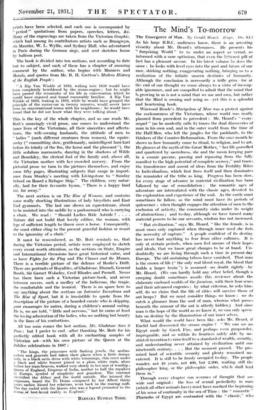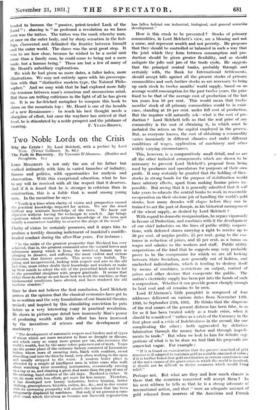The Mind's To-morrow
The Emergence of Man. By Gerald Heard. (Cape. l0.. fkl.) As his large B.B.C. audiences know, there is an arresting vivacity about Mr. Heard's utterances. He presents his ' Surprising World " to us under an aspect so vernal, so informed with a sane optimism, that even the bitterest pill of fact has a pleasant savour. In his latest volume he does the same : he looks with level eyes into the past and future of our race, shirking nothing, exaggerating nothing, bringing us to a realization of the infinite unseen destinies of humanity. Although the conclusion is necessarily a trifle grim—for at ill!: end of our thought we come always to a vista of inescap- able ignorance, and are compelled to admit that the mind that is growing in us is not a mind that we use and own, but rather that the Mind is owning and using us—yet this is a splendid and heartening book.
Winwood Reade's Martyrdom of Man was a protest against the cocksureness of the Victorians, whose world was neatly planned from precedent to precedent : Mr. Heard's " essay- sequel " (as he modestly calls it) traces the dual discoveries of man in his own soul, and in the outer world from the time of the Half-Men, who left the jungles for the parklands, to the thinkers of the Counter-Reformation. From the cave mouth he shows us how humanity came to ritual, to religion, and to art. He glances at the myth of the Great Mother, " her life parcelled and quartered by sacredness, she and the moon keeping pace in a cosmic pavane, passing and, repassing from the fully manifest to the high potential of complete secrecy," and traces the transference and ascent of ideas from the Fertility Rites to Individualism, which first frees itself and then dominates the remainder of the tribe as king. Progress has been slow, for every stage of advance in material civilization has been followed by one of consolidation : the romantic ages of adventure are intercalated with the classic ages, devoted to the exploration and experience of the soul. As the earth must sometimes lie fallow, so the mind must have its periods of quiescence : when thought engages the attention of men to the exclusion of activity, the community sinks under its weight of abstractions ; and to-day, although we have tamed many material powers to be our servants, wisdom has not increased.
" But civilization," says Mr. Heard, " like the female, is in most cases only captured when through inner need she feels the necessity of capture." A people confident of its destiny has never had anything to fear from other cultures. It is only at certain periods, when men feel unsure of their hopes and ideals, that we know great changes to be at hand. Un- doubtedly we are living through such a time in present-day Europe. The old sustaining taboos have vanished. That man is the crown of life (" the only real blood royal, the blood that builds a larger brain ") is assumed—no doubt rightly —by Mr. Heard. (We can hardly hold any other belief, though u creeping doubt sometimes assails this reviewer about the elaborate enclosed worlds of the formicac, with their four sexes and their advanced eugenics ; by what criterion, he asks him- self, do we claim that the life of cities will survive those of ant heaps? But we must consider things we know : we do catch a glimmer from the soul of man, whereas what passes beneath the armour of the ant is utterly hidden.) And since man is the hope of the world as we know it, we can only specu- late on destiny by the illumination of our inner selves.
What would the world have been like, asks Mr. Heard, if Euclid had discovered the steam engine We can see an
Egypt made by Greek Fire, and perhaps even gunpowder, impregnable, and so within its frontiers safely able by un- stinted invention to raise itself to a standard of wealth, security, and understanding never attained by civilization until our
nineteenth century. . . . But the moment passed. The pro- mised land of scientific security and plenty remained un- entered. It is still to be firmly occupied to-day. The people wander, not 40 years, not 400, but 2,300, waiting still the philosopher king, or the philosophic order, which shall lead them in."
- Through every chapter run avenues of thought that are wide and original : the loss of sexual periodicity in man (which all other animals have) must have marked the beginning of his sense of continuity in the sea of Time : the " romantic " -Pharaohs- of Egypt are contrasted with the " classic," who tended to become the " passive, priest-tended Luck of the Land " - shaving is " as profound a- revolution as we have seen was the tattoo. The tattoo was the mask whereby man, at once on the outer body, and by sharp sensation in the feel- ings, discovered. and delimited the frontier between himself and the outer world. The shave was the next great step. It was to see how close, because he wished to be a social unit more than a family man, he could come to being not a mere male, but a human being." These arc but a few of many of Mr. Heard's subsidiary explorations.
We wish he had given us more dates, a fuller index, more illustrations. We may not entirely agree with his preoccupa- tion with that "distinctive modern type, the Natural Philo- sopher." And we may wish that he had explored more fully the tensions between man's conscious and unconscious mind. But these are trifling criticisms in the light of all he has given us. It is no far-fetched metaphor to compare this book to dawn on the mountain top : Mr. Heard is one of the heralds of a new Renaissance : to reach his best thought needs a discipline of effort, but once the wayfarer has arrived at that level, he is stimulated by a noble prospect and the jubilance of

































































 Previous page
Previous page